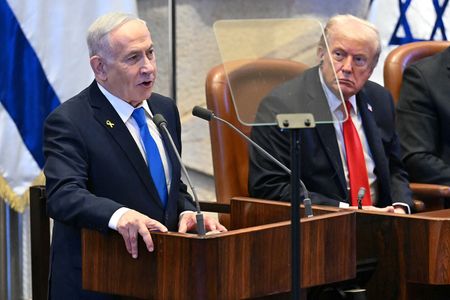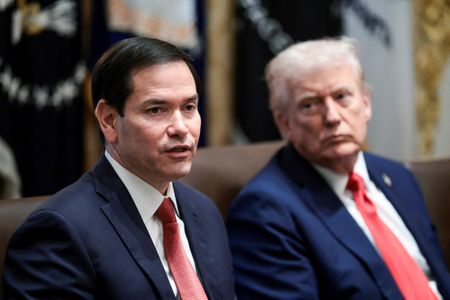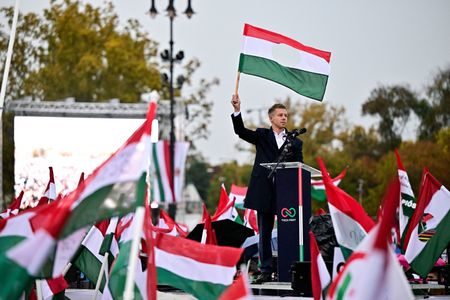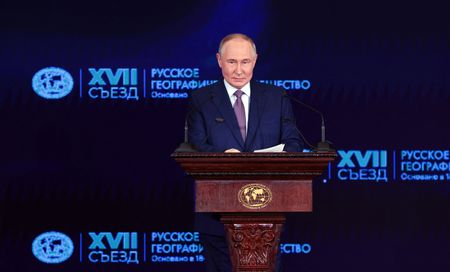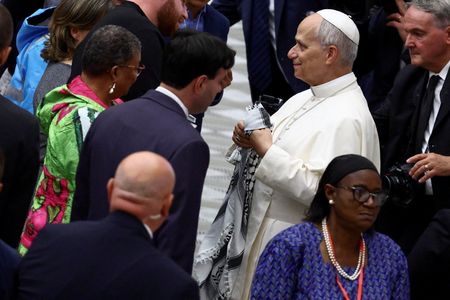By Alexander Cornwell, Simon Lewis and Pesha Magid
TEL AVIV/JERUSALEM (Reuters) -U.S. Vice President JD Vance said on Thursday President Donald Trump would oppose Israeli annexation of the occupied West Bank and it would not happen, suggesting a move by Israeli lawmakers toward that end looked like a stupid “political stunt”.
A bill applying Israeli law to the West Bank, a move tantamount to annexation of a territory that Palestinians seek for part of a future independent state, won preliminary approval from Israeli lawmakers on Wednesday.
Asked by reporters about the vote, Vance said: “If it was a political stunt, it is a very stupid one, and I personally take some insult to it.”
Vance spoke after U.S. Secretary of State Marco Rubio warned that steps toward annexing the territory, which Israel captured in the 1967 Middle East war, could endanger Trump’s plan to end the Gaza war, which has yielded a shaky ceasefire so far.
“The West Bank is not going to be annexed by Israel. The policy of President Trump is that the West Bank will not be annexed. This will always be our policy,” Vance said at the end of a two-day visit to Israel.
FAR-RIGHT OPPOSITION SPONSORED VOTE
The vote was sponsored by a far-right opposition lawmaker who until recently was in the ruling right-wing coalition, and backed by ultranationalists National Security Minister Itamar Ben-Gvir and Finance Minister Bezalel Smotrich. The reading passed by a vote of 25-24 out of 120 lawmakers.
Israeli Prime Minister Benjamin Netanyahu’s office later said that the vote was a “deliberate political provocation” that aimed to sow division during Vance’s visit.
Netanyahu’s Likud party did not vote for the bill, it said, adding that without its support, attempts to legislate the annexation of the West Bank were “unlikely to go anywhere”.
The U.S. has long been Israel’s most powerful and staunch major power ally and the Trump administration is particularly close to Israel with considerable sway over its leadership.
Netanyahu has repeatedly ruled out Palestinian statehood. His cabinet has considered the idea of annexation as a response to major Western allies recently recognising a Palestinian state to put pressure on Israel to stop its devastating war in Gaza, but appeared to shelve it after Trump objected last month.
Senior White House officials and Trump’s son-in-law Jared Kushner have been visiting Israel seeking to keep alive the 13-day-old truce between Israel and Palestinian Hamas militants after two years of war that has upended the Middle East. Rubio is due to arrive in Israel on Thursday.
The U.S. State Department said Rubio was visiting Israel to support the implementation of Trump’s 20-point Gaza plan, which envisages eventual reconstruction and stable governance in the enclave along with possible steps towards Palestinian statehood.
Vance told reporters at Tel Aviv’s Ben Gurion airport that he “feels pretty good” about the Gaza ceasefire after holding talks with Prime Minister Benjamin Netanyahu, other senior officials and the military.
Israel and Hamas have reiterated their commitment to the U.S.-mediated ceasefire while trading accusations of repeated violations since it took effect on October 10.
The deal has so far seen the release of hostages held in Gaza in exchange for Palestinian prisoners held by Israel, a handover of bodies of some deceased hostages, and a partial pullout of Israeli troops.
WEST BANK SETTLEMENTS
There are hundreds of thousands of people living in Jewish settlements across the West Bank. The United Nations and much of the international community consider the settlements illegal under international law.
Israel’s government cites biblical and historical connections to the West Bank, territory that it regards as disputed, and opposes any steps towards Palestinian statehood.
The settlements are a highly volatile issue that has for decades loomed as a major obstacle to Middle East peace, as they fragment territory Palestinians want for a viable state.
Wednesday’s vote was the first of four needed to pass the law and coincided with Vance’s visit to Israel – a month after Trump said he would not allow Israel to annex the territory.
Saudi Arabia, Indonesia, Turkey and 13 other Muslim-majority nations condemned the vote, as did the key multilateral organisations that represent Arab states and Muslim nations.
Trump hopes his Gaza plan will deliver stability across the Middle East and widen normalisation deals known as the Abraham Accords between Israel and Arab states such as the United Arab Emirates to include regional power Saudi Arabia.
The kingdom has repeatedly said it would not strike a deal with Israel without the formation of a Palestinian state.
Speaking at a conference in Jerusalem, Smotrich said that if normalisation with Saudi Arabia is conditioned on the creation of a Palestinian state, Israel should reject the offer and the Saudis should “continue to ride on camels”.
(Reporting by Alexander Cornwell, Simon Lewis, and Pesha Magid; additional reporting by Ahmed Elimam, Tala Ramadan and Nayera Abdallah in Dubai; writing by Michael Georgy; editing by Kate Mayberry and Mark Heinrich)


